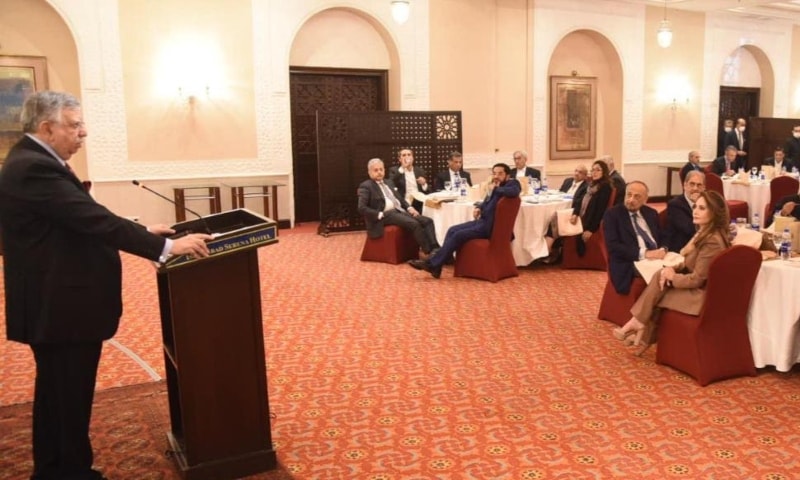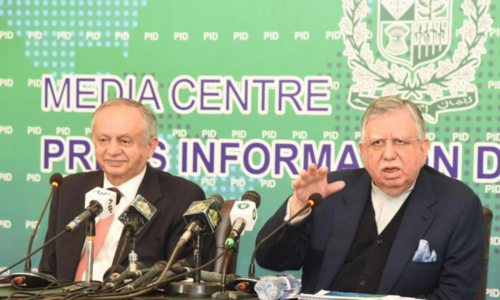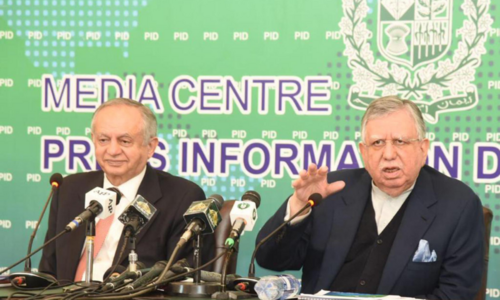ISLAMABAD: Pakistan’s economy did not overheat as commonly believed but faced challenges due to international commodity prices that are now coming down, Finance Adviser Shaukat Tarin said on Thursday.
This ease in the prices of global commodities will minimise external sector vulnerability of the country in the next three to four months, said Mr Tarin while speaking at the concluding session of SDPI’s 24th Sustainable Development Conference titled ‘Beyond the Pandemic: Leaving No One Behind’.
Mr Tarin said the economy is already growing between five per cent to 5.5pc in the current fiscal year. “However, the increase in international commodities prices caused pressure on the external sector of the country. As a result of this increase, inflation in Pakistan also increased along with costly imports,” he said.
Both these factors contributed to rising trade deficit, he said. The adviser noted that prices of gas, petrol and other commodities were already on downward trajectory. “Imports are increased by three to four commodities including petroleum products, steel products and raw materials. This increase is mainly led by an increase in prices and not an increase in quantity,” he added.
Improving revenues
The finance adviser said that one of the indicators of growth in economy was the substantial increase in revenue collection. On the issue of impact of lower and upper-middle classes in urban areas, the adviser admitted the stress of rising prices on these people. We are working on various proposals to minimise it, he stressed.
For sustainable economy, the government is working on improving revenue collection, increasing agricultural productivity and increasing industrial production, the adviser said, adding that the government was working on various proposals in this regard.
Ahead of the finance adviser’s speech, a video message of Prime Minister Imran Khan was run on the screen. The premier said development should be inclusive and must demonstrate trickle-down effects with the aim to empower lower strata of society.
Welfare state model
The PM said the first Muslim state, which was a true welfare state it used to invest in the wellbeing of the poor, including orphans, widows, and daily wagers. He further said it proved the best model of development because it led to the cornerstone of one of the best civilizations.
“I believe that any nation that follows this model will rise. China is the best example of this, which in a very short period alleviated 700 million people from poverty. China exactly followed the model of Riasat-e-Madina by bringing meritocracy and investing in the weaker segment of the society which made their development more inclusive and left no one behind.”
“During the times of Covid-19, there was great pressure on our government to announce a complete lockdown, but keeping in view the vulnerabilities of our people, we choose to go on smart lockdown,” PM Khan said.
Like the developed nations, he added, we have no capacity to feed people at their homes during the lockdown. “Because of the smart lockdown, our food supply chains, agriculture and infrastructure sector did not affect, the premier said, in this way we not only saved our poor people from further economic stress, but also saved our economy,” he added.
Afghan humanitarian crisis
Earlier, at an evening plenary on ‘CPEC in the Emerging Regional Scenario’, National Security Adviser to the Prime Minister Dr Moeed Yusuf said Pakistan did not have the kind of resources to cater for the humanitarian crisis in Afghanistan, whereas to receive international humanitarian aid, the country has no operational banking channels. However, Pakistan would allow every aid to pass on to Afghanistan. He added.
To a question of hosting the brunt of more Afghans, he said: “We are not in a position to host more refugees, though we are now hosting their third generation.”
He said that the real issue is that how we can prevent the forthcoming humanitarian crises.
On the Sialkot incident, Dr Mooed said that intolerance in any form should not be tolerated and it must be ensured that the writ of the state should not be challenged. He said the entire nation has to stand up against such heinous crimes.
Dr Mooed said the issue of intolerance and mob violence in our society needs to be resolved permanently so that such incidents might not happen in future.
Published in Dawn, December 10th, 2021















































